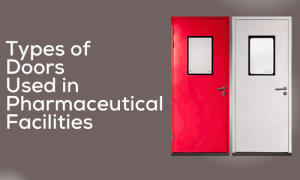In the pharmaceutical industry, maintaining stringent security and regulatory compliance is paramount. Pharmaceutical facilities house valuable assets, sensitive materials, and potentially hazardous substances that require protection from unauthorized access, contamination, and environmental factors. Within this highly regulated environment, the choice of doors plays a crucial role in ensuring the safety, security, and integrity of pharmaceutical operations. In this blog, we’ll explore the significance of pharmaceutical doors and their key features in safeguarding pharmaceutical facilities.
Sterility and Contamination Control: Pharmaceutical doors are designed with meticulous attention to detail to meet the stringent cleanliness and contamination control requirements of pharmaceutical manufacturing and research facilities. These doors feature smooth, non-porous surfaces that are easy to clean and disinfect, minimizing the risk of microbial contamination and cross-contamination between different areas within the facility. Additionally, pharmaceutical doors can be equipped with specialized sealing mechanisms and air pressure differentials to maintain cleanroom conditions and prevent the ingress of airborne contaminants.
Regulatory Compliance: Compliance with regulatory standards, such as Good Manufacturing Practice (GMP) and Good Laboratory Practice (GLP), is non-negotiable in the pharmaceutical industry. Pharmaceutical doors are engineered and manufactured to meet or exceed these regulatory requirements, ensuring that pharmaceutical facilities operate in accordance with the highest standards of quality, safety, and efficacy. From material selection to design and installation, pharmaceutical doors are subject to rigorous quality assurance processes to ensure compliance with relevant regulations and guidelines.
Security and Access Control: Security is a top priority in pharmaceutical facilities, where the protection of intellectual property, proprietary formulations, and sensitive data is critical. Pharmaceutical doors are equipped with advanced security features, including electronic access control systems, biometric authentication, and surveillance integration, to prevent unauthorized access and safeguard valuable assets. These doors can also be customized to restrict access to authorized personnel only, ensuring that sensitive areas such as laboratories, cleanrooms, and storage facilities remain secure at all times.
Temperature and Environmental Control: Many pharmaceutical products, especially biologics, vaccines, and certain medications, are highly sensitive to temperature fluctuations and environmental conditions. Pharmaceutical doors are designed to provide reliable temperature and environmental control, maintaining stable conditions within temperature-controlled storage areas, cold rooms, and environmental chambers. These doors are insulated to prevent heat transfer, equipped with tight seals to minimize air leakage, and compatible with HVAC systems for precise climate control, ensuring the integrity and efficacy of pharmaceutical products throughout their lifecycle.
Fire Safety: Fire safety is a critical consideration in pharmaceutical facilities, where the presence of flammable chemicals, solvents, and materials poses inherent risks. Pharmaceutical doors are available with fire-rated specifications to provide passive fire protection, containing fire and smoke to prevent its spread to other areas of the facility. These doors are tested and certified to withstand fire for a specified duration, allowing occupants to evacuate safely and emergency responders to contain the fire effectively.
Versatility and Customization: Pharmaceutical doors come in a variety of configurations, materials, and finishes to accommodate the diverse needs and requirements of pharmaceutical facilities. Whether it’s hinged doors, sliding doors, or rapid roll-up doors, pharmaceutical doors can be tailored to fit specific spatial constraints, operational workflows, and aesthetic preferences. Customization options such as vision panels, access control integration, and antimicrobial coatings further enhance the functionality and performance of pharmaceutical doors, ensuring a seamless fit for any pharmaceutical environment.
In summary, pharmaceutical doors are indispensable components of pharmaceutical facilities, providing essential functions such as sterility control, regulatory compliance, security, environmental control, fire safety, and customization. By investing in high-quality pharmaceutical doors, pharmaceutical companies can ensure the integrity, safety, and security of their operations while maintaining compliance with regulatory standards and industry best practices.





